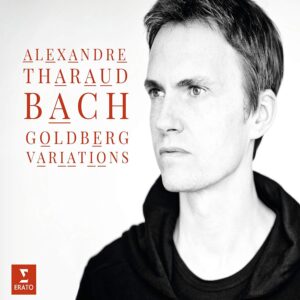When Alexandre Tharaud, the finest pianist of his generation for miniatures, recorded the Goldberg Variations, expectations ran high. From this miniatures master one might expect each variation to be treated as an individual gem, but perhaps at the expense of the proverbial “long line”. Tharaud’s performance quickly makes nonsense of such speculations: He clearly plays one piece, not 32. He plays–so it initially seems–at an almost unyielding swift clip. Is Tharaud aiming at Glenn Gould’s 40-minute mark? A whopping 75-minute playtime tells us “No”. This is aurally confirmed when we hit Variation 9, the first time Tharaud takes something resembling a break from his quick pace. He appears to snap right back, a tempo as it were, when it turns out that the sense of momentum isn’t so much due to a “clip” but to the pulse he threads into the music.
Tharaud’s playing is lively even at slower speeds, which makes it deceptively (deliciously) alive and palpitating. The rest of the considerable playtime is due to the fact that there’s no repeat-skipping here. With the Variations crisply fired out, kept in place by the steadiness of the rhythm, these Goldbergs establish themselves as the polar opposite to Tzimon Barto’s wilful, lingering, one-variation-at-a-time, must-hear account (Capriccio).
While Tharaud also gives each Variation its own character, each piece of the puzzle locks neatly into the next. In that sense it is almost as if Tharaud only had the long line in sight. That’s until he arrives at the Da capo Aria, which is suddenly, almost surprisingly shaped in a much more genteel, softer, elegantly romantic style, as if it were a summation of who he is as a pianist. It is only on visiting individual Variations that the more particular shaping that belies this over-all impression comes to the fore.
As in Variation 13, for example, which then reveals a trademark “Tharaud-loveliness”, in an understated way. Or in Variation 16, with its pompous little bluster of an orchestral overture. To be sure, if the name on the cover were someone else’s, I might have dismissed this on first hearing. Because it is Tharaud, I went on a quest of exploration that scrutinized my listening as much as his playing. Such closer scrutiny often–not always–yields benefits. Here they are considerable. Accounts that wear their qualities more obviously on their sleeves will probably remain my favorites, but this will be my greatly cherished corrective.
































